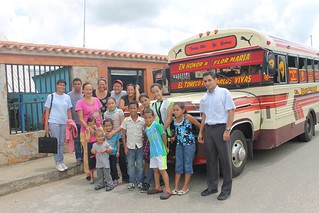 |
| We rented this bus to take the youth on a retreat in 2015. |
A Venezuelan Facebook friend recently observed that, in 2007, a new car cost about 30,000 bolivares, Today, 30,000 bolivares buys a one kilogram bag of sugar. Such is the magnitude of Venezula's skyrocketing inflation, which is expected to continue.
If we could have
predicted this situation, we might not have turned down the offer of
a used car back in 2005. A car or light truck would have been useful
for transporting people and supplies, but we decided the stated price
versus the condition of the vehicle meant it was not such a great
deal.
So, for more than
decade, we have relied on taxis and buses, sometimes hiring a truck
to carry construction materials. Sometimes, the logistics were
tricky, but we made due without too much difficulty. Recently,
however, the situation has gotten much worse, and the purchase of our
own vehicle is far beyond our reach.
It's more
complicated than simply costs
that double every 17 days, although raising funds to keep up with
the inflation is a concern. We also have to cope with limits on how
much cash we can withdraw from the bank in one day. You can withdraw
a maximum of 10,000 bolivares per day from an ATM machine, regardless
of how much you have in your account. If you have time to wait two or
three hours to talk to a bank clerk, you may withdraw a maximum of
30,000 bolivares.
One thing we have
going in our favor is being able to do most of our financial
transactions on-line. Even so, after someone stole the fiber optic
cable that provides voice and data communications for La Caramuca,
not only were we without telephone and Internet access at the
mission, none of the businesses in La Caramuca could accept
electronic payments through their point-of-sale devices. We are
thankful that landline service has been restored.
Nevertheless, the
taxis, buses and trucks for hire alway require cash payment. A bus
into Barinas now costs 500 bolivares per person, while taxi fare is
20,000 bolivares. Obviously, the buses are more economical. But
taking the bus is very slow, because there
are fewer buses in service. Luz Maria had to wait three hours the
other day for bus back to La Caramuca from her mother's house in
Barinas.
So we have to
carefully plan our trips into town, based on amount of time and money
that we have available each day. But our worries do not end with the
rising cost and declining availablity of public transportation. Let
me illustrate by describing our recent trip to Caracas.
Twice a year the
Lutheran Church of Venezuela schedules national pastors conferences.
There are fewer than 20 ordained pastors in the Lutheran Church of
Venezuela, so it's easy to get us all in one room. Maybe we could all
stuff into a phone booth, if there still were phone booths around. I
missed the last one because on the day that Luz Maria and I were to
leave for Caracas, there was a blockade on the highway to Caracas.
Things have quieted
down a bit since then, so the first week in October we set out for
Caracas. Our bus had mechanical problems once along the way, but
otherwise the trip was uneventful. There's not much to say about the
pastors conference, either, although some positive action was taken.
On the day we
planned to return to La Caramuca, however, we were unable to buy bus
tickets. All the bus lines now require that you buy tickets on the
day of departure, and on the day of our departure we discovered that
none of the bus lines in Caracas would accept electronic payment.
They wanted cash, to the tune of 30,000 to 40,000 bolivares per
person. By the next day, we were able to come up with the cash, after
visitng several banks where Luz Maria and I have accounts (not all of
them had any cash for us to withdraw at all).
So we left by bus
the following evening. (There are, by the way, only two flights each
week out of the Barinas airport, to and from Caracas on Friday and
Sunday, so traveling by air is not more convenient and is still more
expensive). But that's not the end of our story.
As we were on the
way back to Barinas, at about 10 that night, the bus blew a tire and
started swerving across the highway, just barely missing oncoming
traffic. But that's not what frightened the passengers most. No one
thought the blowout was an accident. There have been reports of gangs
strewing sharp objects across the highway for just that purpose. When
the bus is disabled, the robbers take all the luggage, everyone's
wallets, cellphones and other paraphernalia, even shoes and clothing
that look expensive.
Fortunately for us,
if the blowout was the result of such a trap, the gang was busy
elsewhere. The driver, his assistant and two young passengers who
agreed to help, were able to replace the tire quite rapidly and we
were on our way. However, this shows why travel in Venezuela has
become both slower and more risky.
This happened the
week after the day on the church calendar dedicated to St. Michael
and all angels (September 29), so we remembered Martin Luther's
evening prayer:
I thank You, my
heavenly Father, through Jesus Christ, Your dear Son, that You have
graciously kept me this day; and I pray You to forgive me all my sins
where I have done wrong, and graciously keep me this night. For into
Your hands I commend myself, my body and soul, and all things. Let
Your holy angel be with me, that the wicked foe may have no power
over me. Amen.
No comments:
Post a Comment